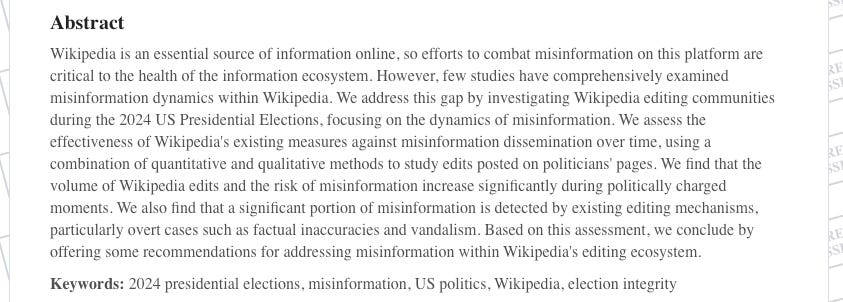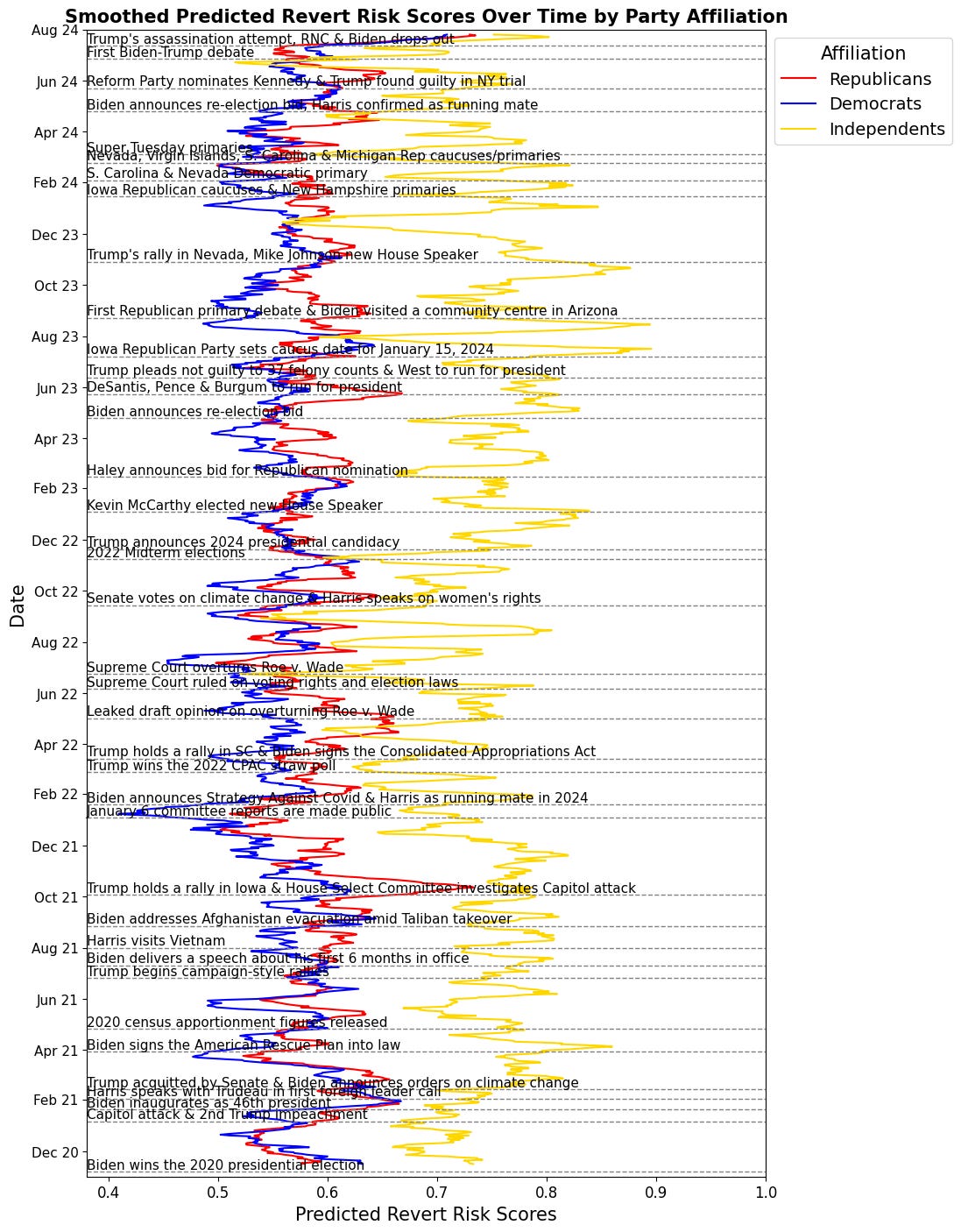Welcome back to the Ethical Reckoner. In this Weekly Reckoning, we cover stories from K-pop (where a singer is getting canceled for having a girlfriend), US politics (dueling tech money influencing voters), and Cuba (where the power grid is collapsing). Then, we turn to misinformation on Wikipedia as I explain the findings of a new study from my research center.
This (slightly belated) edition of the WR is brought to you by… NYC, Providence, San Francisco, San Carlos, NYC (again), and New Haven (aka my travels of the last 10 days)
The Reckonnaisance
The K-popdom is imploding
Nutshell: Controversy around the suspension, reinstatement, and firing of RIIZE member Seunghan is embroiling K-pop.
More: Seunghan was suspended from the group ten months ago after photos from his private Instagram leaked. The photos showed him smoking and kissing his girlfriend—which in the socially conservative atmosphere in South Korea (which is especially thick around K-pop groups, who are expected to be paragons of virtue) was unacceptable. He was placed on hiatus last November. On October 11, RIIZE announced his return, but this period of “reflection and growth” was not penance enough for some fans, who picketed and placed hundreds of funeral wreaths outside their management team’s headquarters. A counter-petition by international fans has nearly 300,000 signatures, and dueling hashtags on Twitter reached even non-K-pop fans.
Why you should care: When I first heard this story on Slate’s ICYMI podcast, I was flabbergasted. But it presents some really interesting questions on fandom and culture. K-pop is Korean in origin, but has international fans. Who should set the behavioral and cultural norms for performers? Pop stars in the US have done things far more risqué than post a picture of them kissing a girl; from our perspective, it’s pretty wild that he got canceled for that. But it’s also a commentary on the power of stan culture, which is significant and scary.

Cards Against Humanity, Elon Musk duel on voter payments
More: Cards Against Humanity bought a lot of voter data and used it to see if individuals had voted, where they lived, and their partisan lean, and then offered previous non-voters up to $100 to apologize and make a voting plan. Meanwhile, Musk is giving $1 million every day to a random Pennsylvania voter who signed a petition on free speech. The US legal code makes it a crime to pay anyone to vote. Cards Against Humanity put in the fine print that the payment is not predicated on actually voting, but Musk’s is, meaning that he may be in violation of the law. Cards Against Humanity is also suing Musk for dumping SpaceX equipment on land they bought on the Texas border.
Why you should care: CAH is known for funny stunts around elections, but this one (though it’s now ended) was aimed at increasing blue turnout but also at drawing attention to the US’s sketchy data practices. With a small investment, they can acquire data on pretty much every US voter and figure out their voting history, where they live, and how they’re likely to vote. (Both campaigns are now digging through similar data to find pockets of undecided voters.) Musk’s payments are a more naked attempt to get people to vote red in Pennsylvania. We can’t even criticize it as dark tech money, since he’s doing it in the full light of day, but regardless of your partisan affiliation, it does still show the huge power that tech money has in US elections.
Cuban power grid collapses
Nutshell: Cuba has been experiencing nationwide blackouts for days amidst a fuel shortage.
More: Cuba was implementing rolling blackouts to preserve power, but on Friday, its main energy plant failed. Despite intermittent efforts to restore power, many people are going on four days with no electricity—meaning no lights, no water, no A/C, and often no stove—and now Hurricane Oscar isn’t helping matters. People are taking to the streets to protest, but there’s nothing to be done except wait for the government to restore power capacity, which is currently at less than 1/6 of what’s needed.
Why you should care: Amidst discussion of generative AI and how we need to scale our grid and renewables to sustainably meet its power demands, it’s important to remember that without basic infrastructure, there is no advanced tech. And it’s just as important to put it into perspective that while we debate tech ethics, 2.6 billion people aren’t connected to the Internet. There will always be a place for research on the invisible elements of tech that we—especially in the Global North—often overlook.
Extra Reckoning
Are you worried about fake news online? Well, you’re not alone. And a lot of people in that group are Internet researchers—including myself. That group also includes people who run online sites where people get information—including Wikipedia. So when the Wikimedia Foundation asked the Yale Digital Ethics Center to investigate election misinformation on Wikipedia in the run-up to the 2024 US presidential election, we were excited. Personally, I was excited because it meant I got to play with code again during the data collection process, but also because Wikipedia is the 7th most trafficked site in the world and the way many people get information, so the integrity of its information is hugely important.
Over the last few months, a team at the DEC has been doing extensive analysis to see how much election-related misinformation there is on Wikipedia. The good news: they’re doing a pretty good job. When looking at the pages of presidential candidates and Congresspeople, we found misinformation, but not a ton—less than 2% of all edits we looked at had misinformation. Furthermore, much of this was reverted rapidly, showing that Wikipedia’s existing processes are solid—it wouldn’t be such a trusted source of information otherwise. However, we think there are improvements that could be made, including around making it easier to block nuisance editors and how to protect pages to reduce the likelihood of misinformation in the first place.
Diving into the data more deeply, we found that frequency of edits and the likelihood of misinformation spiked around significant political events. In the time series below, you can see how the number of edits spiked over time, and we also found that the likelihood that an edit would be undone increased on many of these days as well.
So overall, what does this mean? If you’re reading the English Wikipedia pages of well-known politicians, you can be pretty confident that the information you’re reading is correct, and grateful to the Wikimedia Foundation for creating such a comprehensive and reliable source of information. However, still read with a cautious eye. If something seems obviously false, take it with a hefty grain of salt, especially if you’re on a less popular page. Another important caveat: we only analyzed English Wikipedia. Other wikis have fewer editors, and thus an increased likelihood that there will be misinformation. In our research, we discovered a report about how Croatian language Wikipedia was wholesale captured by a group of ideologically-aligned administrators, and a story about a Chinese woman who basically got bored and started making up articles about Russian history. In our research, we didn’t discover anything on this scale—misinformation didn’t appear to be emanating from any singular source, and while there were some nuisance actors, they didn’t seem to be coordinated.
Honestly, doing this research was fairly reassuring, and I hope it shores up trust in our information ecosystem. If you want to read the whole thing, it’s available here.
I Reckon…
that hiring Daleks is exactly what the NHS needs.
Thumbnail generated by DALL-E 3 via ChatGPT with a variation on the prompt “Generate a brushy abstract Impressionist painting in a consistent color palette representing the concepts of misinformation and confusion.”








Question on AI, language, and Wikipedia since it sounds like you've been thinking about it!
I was trying to learn about a town in the middle of Spain the other day.
There's hardly any information about it on the english version of the page: https://en.wikipedia.org/wiki/Elvillar/Bilar
Only a little more in the Spanish version: https://es.wikipedia.org/wiki/Elvillar
And I had to click the basque language version to get a lengthy entry: https://eu.wikipedia.org/wiki/Elvillar
I don't know how good AI translators have gotten, but I have to assume they're pretty good, which makes me wonder: when, if ever, should I expect wikipedia to automatically give me all the information siloed in the basque-language-wiki in english (or whatever my default language might be)?